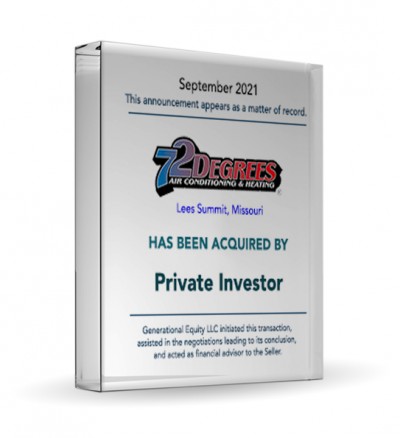
Exit Planning Mistake 1 – Losing Focus
By Generational Equity
07/06/2016
One of the first things we emphasize to our clients when they begin the process of looking for optimal buyers is this: Do not lose focus on running your company!
This may sound simplistic. However, we often meet business owners at our exit planning conferences who share with us their lamentation about losing a deal with a great buyer because at the 11th hour of negotiations it became apparent that the company was significantly off its projected earnings due to the owner being distraction while trying to find a buyer.
This is something that we hear all the time from our clients who have successfully completed the Generational Equity (part of the Generational Group) 15-step M&A program:
I could not have completed my transaction without Generational Equity’s help because their diligence helped me to focus on the most important issues during the lengthy, time-consuming process of finding a buyer: Keeping my business achieving its base year goals.
You can listen to their thoughts on the importance with our featured video.
The common thread in all of these is the same: I had no idea how complicated finding a buyer/investor for my business would be, and if I had been doing so without professional help, there would have been no way I could have focused on running the company effectively.
How Are Your Company’s Numbers YTD?
One of the key questions that most buyers will ask you throughout the 3-4 months of intense due diligence and deal negotiations is this: How are your numbers tracking? And they will ask you this repeatedly because the base year, the fiscal year you are in while trying to close your transaction, is key; it is the jumping off point for your five years of projected revenue and earnings.
If you are trending at 10% or more while in negotiations, most buyers will be concerned. Will this typically kill a deal? Often, it will not; however, it will definitely impact your deal structure. In many cases like this, the buyer will require some holdback in the form of an escrow for a year or more to ensure your targets are eventually hit.
In some situations, you may even be tied to the company’s future performance in the form of an earnout, which can often be structured for a year or more. This is where future payments to you are contingent upon the company hitting pre-determined earnings targets and usually require you to remain in a management role for a specified timeframe. This structure does not meet the needs of the CEO looking for a quick retirement post close.
Other forms of structure are also possible if your business is not hitting its targets during the base year. So by all means, focus on running your business while your M&A advisor concentrates on closing an optimal deal for you.
And if you make exit planning mistake No. 2 and are acting as your own M&A counselor, be sure to have a very strong management team in place who can run the business during the year or more (and 1,000 hours of your time) it often takes to close a deal with an ideal buyer.
In addition, be aware that it will be increasingly difficult to maintain confidentiality of your exit process if you are not using a professional firm to aid you. Most likely you will need to confide in your leadership group at a minimum since you will be missing quite a few hours of work and will be increasingly relying on them as the process gets closer to completion.
What about Important Decisions?
Bottom line: Under either scenario (with professional M&A guidance or not) it is vital that you continue to focus on the successful operation of your company while marketing the business. For example, do not delay or shelve vital decisions. Clients often ask us, should I hire a replacement for my operations manager or should I allow the new buyer to hire who he/she wants? Should I delay the planned capital expenditure next month that is needed to expand my product line? My lease is up for renewal soon, should I re-sign or delay?
The answer to all these questions is nearly always the same. Even though we are actively looking for buyers for your company, you need to continue to run it as if you are NOT planning to sell/exit. Delaying key strategic decisions can negatively impact your valuation since buyers are acquiring your company’s future growth, and key decisions that are postponed can potentially impact their valuation models, especially items that directly impact the bottom line (which nearly every decision does).
There are other exit planning mistakes that you should also avoid. To learn more about them, please download and review our complimentary whitepaper on the topic.
In addition, you can also attend one of our exit planning conferences, which will provide you with a wealth of information about how to successfully close a deal with an optimal buyer.



